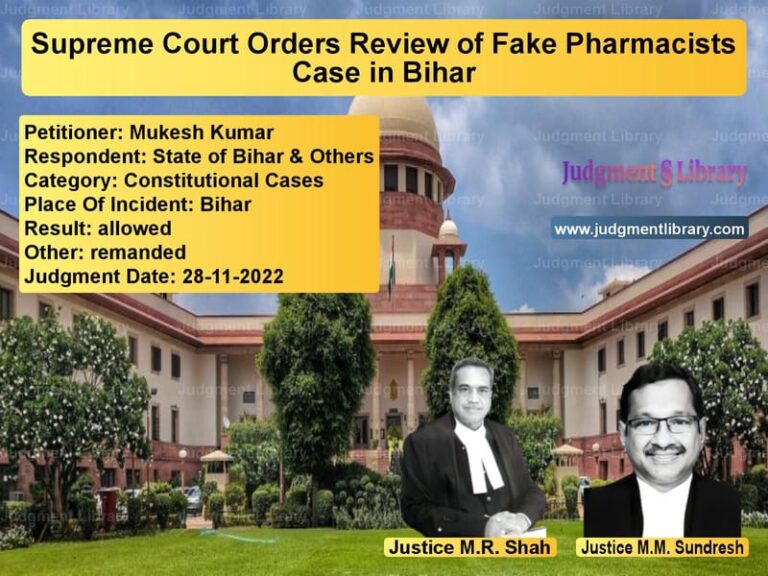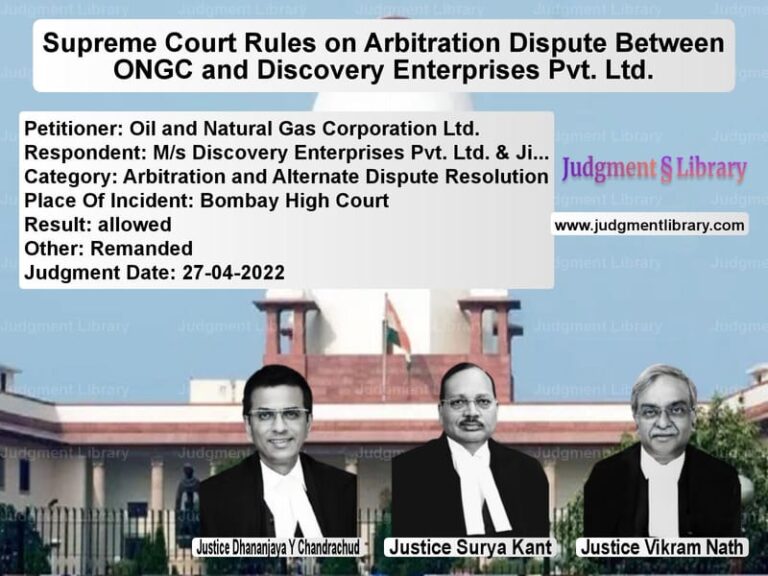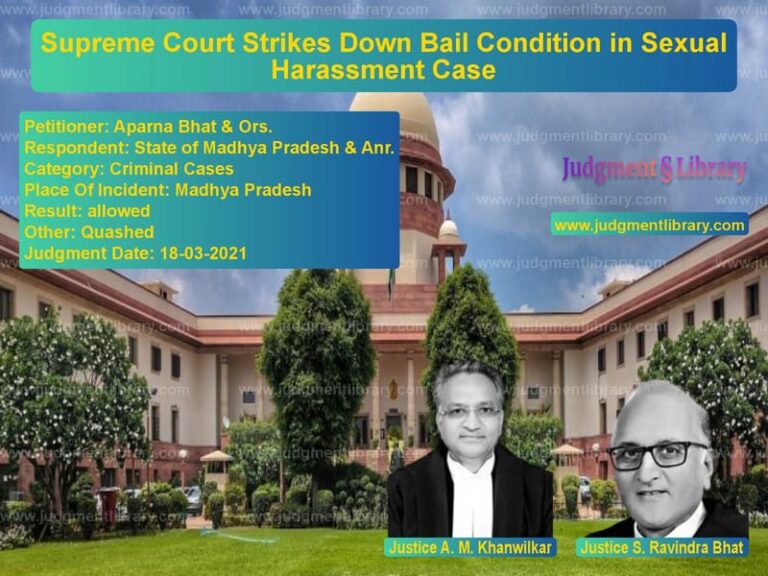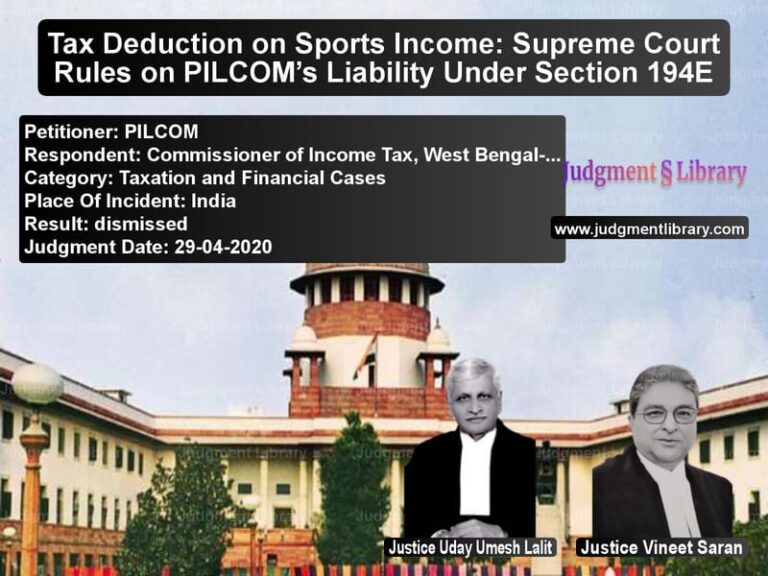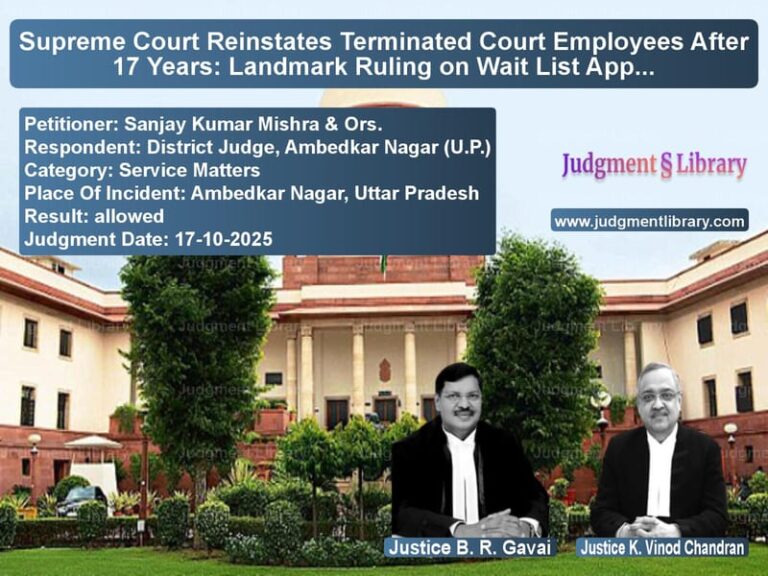Supreme Court Rules on Promotion Criteria for UP Police Sub-Inspectors
The case of Lance Nayak Raj Bahadur & Others vs. State of Uttar Pradesh & Others involved the challenge to the Uttar Pradesh Police Department’s limited departmental examination for promotion to the post of Sub-Inspector. The Supreme Court had to decide whether the selection process was fair and whether reservations and relaxation in qualifying marks should be granted to Scheduled Caste (SC) and Scheduled Tribe (ST) candidates.
Background of the Case
The appellants, all serving as Constables and Head Constables in the Uttar Pradesh Police Department, belonged to the Scheduled Caste category. They appeared for a limited departmental examination held in 2008 under the Uttar Pradesh Sub-Inspector and Inspector (Civil Police) Service Rules, 2008, which prescribed a minimum 50% mark requirement in each subject for eligibility.
Following the examination, it was discovered that 18 questions in the test were erroneously framed. The Allahabad High Court directed that all candidates be awarded full marks for these incorrect questions. However, the issue of relaxation in qualifying marks for SC/ST candidates remained unresolved.
Key Legal Issues
- Whether the 50% mark requirement should be relaxed for SC/ST candidates.
- Whether subjects 3 and 4 in the examination should be considered together or separately for the 50% cutoff.
- Whether the selection process had violated the reservation policy.
Arguments Presented
Petitioners (Lance Nayak Raj Bahadur & Others)
- SC/ST candidates were entitled to relaxation in minimum qualifying marks under the general reservation policy.
- Subjects 3 and 4 (Numerical Ability and Mental Aptitude) should be treated as a single paper, and the 50% threshold should apply to the combined score rather than each subject separately.
- The recruitment process did not follow proper reservation guidelines, unfairly disadvantaging SC/ST candidates.
Respondents (State of Uttar Pradesh)
- The rules clearly stipulated that each subject required a minimum of 50% marks, and no relaxation had been officially provided.
- The Supreme Court had previously ruled in a similar case that the criteria must be followed strictly without compromise.
- Reservations apply only to final selections and not to qualifying marks in examinations.
Supreme Court’s Observations
1. No Relaxation for SC/ST Candidates
The Court held that the 2008 Rules did not provide for relaxation in the 50% mark requirement for SC/ST candidates. Since no relaxation was prescribed by the State, the Court could not introduce a new criterion.
2. Interpretation of Subjects 3 and 4
The petitioners argued that Numerical and Mental Ability Test (Subject 3) and Mental Aptitude/IQ Test (Subject 4) should be treated as one paper. The Court rejected this argument, stating that the rules explicitly required 50% marks in each subject, and the structure of the examination did not allow for merging scores across subjects.
3. No Violation of Reservation Policy
The Court clarified that reservation applies to selection, not to qualifying marks. It observed:
“The criteria under the Rules is minimum of 50% marks in each of the subjects. It was open to the State to have prescribed a relaxed or a different criterion for the reserved category candidates. However, no such relaxation was granted by the State and consequently no relief can be granted by the Court.”
Final Judgment
The Supreme Court ruled:
- The 50% mark requirement was valid and applicable to all candidates.
- There was no violation of the reservation policy.
- The appeals were dismissed, and no relaxation in marks was granted.
Implications of the Judgment
- It reinforces that courts cannot create new eligibility criteria beyond those prescribed by law.
- It clarifies that reservation policies apply to selection, not qualifying marks.
- The decision upholds merit-based promotion in government services.
Conclusion
The Supreme Court’s ruling ensures that recruitment and promotion processes remain fair and transparent. While reservation policies support SC/ST candidates, they do not extend to modifying eligibility criteria unless explicitly provided in the rules. The judgment reinforces the importance of following statutory regulations in service matters.
Petitioner Name: Lance Nayak Raj Bahadur & Others.Respondent Name: State of Uttar Pradesh & Others.Judgment By: Justice Uday Umesh Lalit, Justice Indu Malhotra.Place Of Incident: Uttar Pradesh.Judgment Date: 09-05-2019.
Don’t miss out on the full details! Download the complete judgment in PDF format below and gain valuable insights instantly!
Download Judgment: Lance Nayak Raj Baha vs State of Uttar Prade Supreme Court of India Judgment Dated 09-05-2019.pdf
Direct Downlaod Judgment: Direct downlaod this Judgment
See all petitions in Promotion Cases
See all petitions in Recruitment Policies
See all petitions in Public Sector Employees
See all petitions in Judgment by Uday Umesh Lalit
See all petitions in Judgment by Indu Malhotra
See all petitions in dismissed
See all petitions in supreme court of India judgments May 2019
See all petitions in 2019 judgments
See all posts in Service Matters Category
See all allowed petitions in Service Matters Category
See all Dismissed petitions in Service Matters Category
See all partially allowed petitions in Service Matters Category


